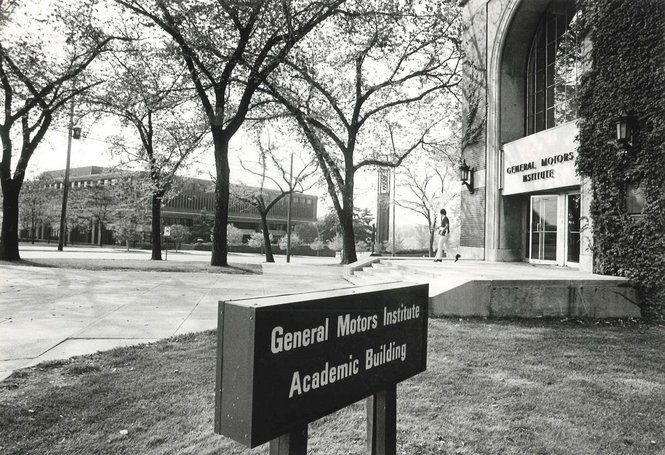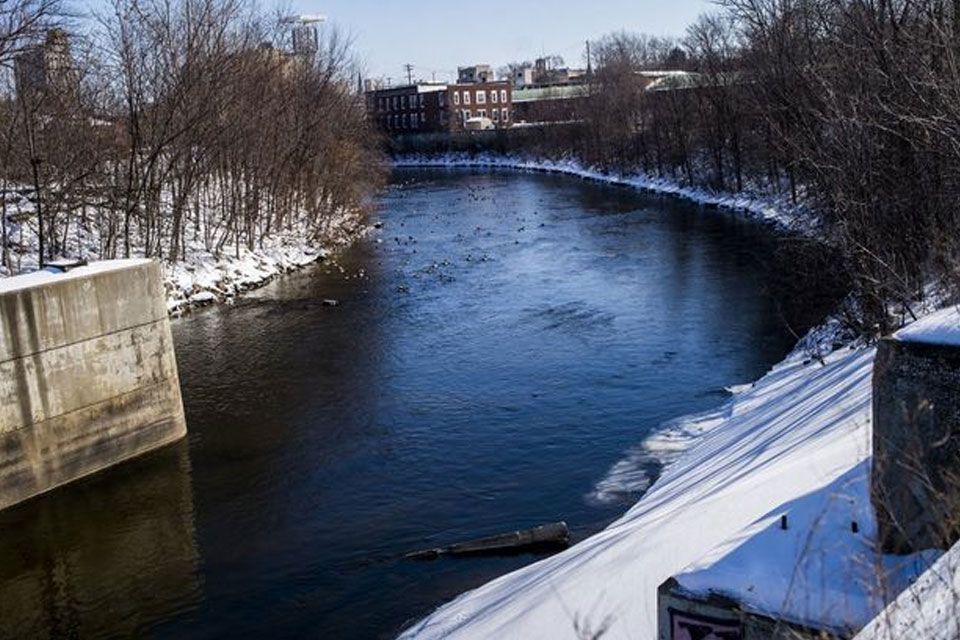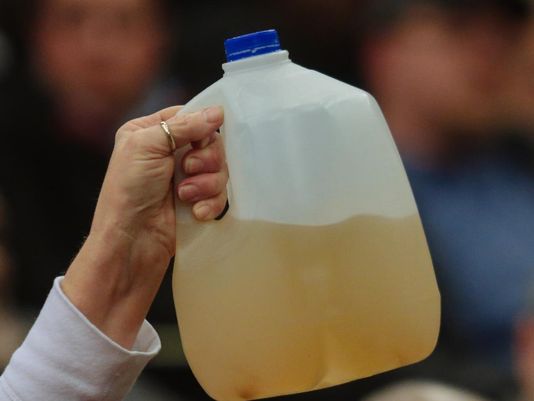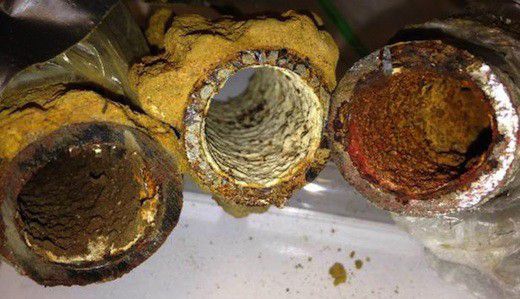A Crisis in Michigan
I've lived in the state of Michigan for nearly my entire life.
When I was four, my mom was newly divorced. With only a high school education, no job, and now a single parent of two children under the age of five, she had no choice but to move to Michigan so her parents could support her.
My grandparents had just moved here as well. My grandfather had been offered a job at General Motors to be vice president of Research and Development. Luckily for us, he was able to provide us with a place to live and pay for the college education my mom needed so she could take care of the three of us.
That's how I came to grow up in a General Motor's factory town in Michigan. About an hour north of my city was another General Motor's factory town called Flint. I spent a lot of time in Flint in my late teens and early twenty's because my boyfriend (now husband) went to university there.
He was another Michigan transplant, like me, and he'd come here because of the automotive industry. Ever since he'd been a small child, he'd been fascinated with cars and how they worked. It was that fascination that led him to decide to become an automotive engineer, and General Motors had an engineering university, General Motors Institute located in Flint, Michigan.

By this time, Flint, like my hometown Pontiac, had seen better days. General Motors had made the decision to close the factories in Michigan, where they had to pay union workers a living wage, and ship those jobs to third world countries where they could pay people far less for the same work.
As the jobs dried up, those who could find work elsewhere, escaped the state. Those who couldn't, watched their communities whither and then become blighted with poverty, crime, and drugs. The story of what happened to Flint was documented in the hit film Roger & Me, in case you're interested in learning the whole story.
Even though times were tough in Flint, I have many fond memories of the days I spent there. The best used book store I've ever had the pleasure of visiting was Jellybeans. It had great finds in books and records, but even better was the treasure trove of old knitting magazines.

There was Wolf's Scrap Iron and Metal where the guy who owned it (not named Wolf) would let anyone go back in the acreage of discarded autos and scrounge around for old parts, no matter how dangerous it might be. Everything was sold at scrap metal prices, way below what anyone else would have charged for some of those parts.
And there were the frat parties. I may have attended a few – okay, a lot more than a few, at the fraternity houses of GMI. (Women had only recently been allowed to attend the school so there were no sororities). Many of the frat houses were across the street from a public golf course which had been built in the flood plain of the Flint River.
The first year my husband attended GMI, he appeared in the talent show dressed as a carp while his friends sang an original song called 'The Mighty Flint', an ode to that river.

I need to back up a bit.
Michigan is one of the more unique states in the United States (we like to think it's the most unique state) because it's in the shape of a giant mitten. You can spot it easily from space because we're surrounded by the Great Lakes, the largest system of fresh water lakes in the world formed by glaciers 10,000 years ago. I grew up drinking water from one of those lakes, Lake Huron via the Detroit water system. I can tell you that water tasted great, and it was considered among the best city water in the country.
The Flint residents drank that water too. Or at least they used to.
Fast forward to 2010. It was time for us to elect a new governor for our state. We'd had a very popular Democratic governor for eight years, Jennifer Granholm, but her time was up and the job was open. One of the people running for that job was Rick Snyder, a Republican. As it happened, he lived in the same city my husband and I had settled in to raise our family, his house was just a mile from my house. He had a daughter the same age as my youngest daughter, and they had a lot of friends in common.
Running as a Republican in the aftermath of the George Bush presidency (he'd only been out of office for two years) was a pretty tough road for Rick Snyder. Republicans were struggling against public perception, but he said he was different from all the other Republicans. His campaign slogan was 'One Tough Nerd'. He said he was a moderate who would work with both political parties. He didn't believe in ideology, he believed in common sense solutions, and it worked. He got elected.
People can have differing opinions about what's the right way to run a state, or which American political party has the best ideas for the problems this country faces. But there should be some things that you just don't mess with no matter what your beliefs are, like the public's health and safety, or a little thing called democracy.
In his first month in office, Governor Snyder signed a law that gave increased powers to something called 'emergency financial managers'. If a city hit hard times and couldn't pay taxes owed to the state, the governor now had the power to strip the democratically elected officials of that city of all their powers, and appoint an emergency manager to run the city instead. The job of the emergency manager was to cut costs, supposedly to bring about the financial health of those cities, and they were accountable to only one person, Governor Snyder.
Detroit, the largest city in Michigan, my hometown Pontiac, and Flint were among a number of cities that were taken over by the governor and his emergency managers. It wasn't lost on anyone that all the cities that had emergency financial managers appointed were primarily African-American cities, and of course, desperately poor.
Flint's emergency manager decided a great way to save money was by no longer paying Detroit for the Lake Huron water. Instead, the city would build their own pipeline to Lake Huron where they could draw their own free water. But building a 70 mile pipeline across counties and cities takes time, years actually, and Flint needed to save money right away. The solution? The city would get their drinking water from the Flint River while they were waiting for the pipeline to be finished.
So two years ago, a city of 100,000 residents were switched from drinking fresh lake water to river water.
Almost immediately, the residents noticed the water smelled bad, and it tasted funny. As time went on, the water became more brown in color than clear. They got rashes from bathing in it, and their hair started falling out. They complained that something was wrong with the water, but they were ignored by the emergency manager and Governor Rick Snyder.

Six months later, the one General Motors plant still in Flint announced they would no longer use the city water because it was corroding their engine parts. The state still insisted the water was safe for people. They said the problem with GM was that the water didn't react well with the paint they were using.
A scientist from Virginia heard about what was going on and came to test the water in Flint homes. He found high levels of lead in most of the homes he tested and sounded an alarm. That's because there is no level of lead in water that is considered safe for humans. State officials claimed he was a huckster who always came up with the same conclusions wherever he tested water. They conducted their own tests and cherry-picked the results to 'prove' there was no problem with lead in the water.
A pediatrician who was also concerned about the water, started testing the blood of the children she was seeing, and was horrified that most of them showed elevated levels of lead. Lead is especially dangerous for children under six. It can permanently affect their brain development, lower their IQ's and give them behavioral problems. State officials said she'd made errors in her study, and bitterly complained in private emails that bringing up the fact that children might be harmed was turning the issue into a 'political football'.
A year and a half after the switch, the residents of Flint were becoming more alarmed as brown water came out of their taps, but the response from the state government was that they should just relax. The water was perfectly safe.
It wasn't until nearly two years had passed, that the state government could no longer push the issue under the carpet. They could ignore the poor people of Flint, but when local and national media started covering what was being done to them, the state was finally forced to admit the water wasn't safe.
How did lead get in Flint's water? River water and fresh lake water have very different chemical compositions. When told that the Flint River water would have to be treated with chemicals costing $100 a day or $36,500 a year to make it less corrosive, the emergency financial manager decided that was too much money. Untreated river water flowed through the metal pipes in the city, corroding them along with the lead solder used to seal them, leaching lead into the drinking water of the entire city.

All the men, women, elderly, children, pregnant women, babies drinking powdered formula, inmates in the city's jails, pets, and the students at my husband's old university have been exposed and maybe permanently poisoned with lead. 87 people got sick and ten died from Legionnaires Disease caused by bacteria in the water during those two years. What other health effects they may have suffered, what cancers they may get, are still unknown.
The city has switched back to Detroit/Lake Huron water, but it's too late. The pipes have been permanently ruined. The water is still not safe to drink, bathe in, wash food or dishes, or even to brush teeth.
You would think immediate arrangements would have been made to provide the city with safe water as soon as they admitted people shouldn't drink the water, but Governor Snyder did nothing. It took him two months to get around to declaring a State of Emergency. Two months where the residents had to either buy bottled water, or if they didn't have the money, find water donated by private citizens. If they ran out of money and bottled water, they had no choice but to drink the lead poisoned water.
Even after declaring a State of Emergency, the governor's response has been anemic at best. After he was shamed by increasingly outraged national media attention, he said water filters and bottled water would be distributed to every household. But only a handful of people were put on the job in a city of roughly 40,000 homes. Weeks later, large portions of the city have never had someone knock on their door, not even to make sure they know they shouldn't drink the water.
As concerned people all over the country, celebrities, and private companies have stepped in to try to provide Flint's residents with bottled water, Governor Snyder has been quick to deal with one part of this national man-made disaster. He's hired a PR firm to help him manage his 'messaging'. They're probably the ones who told him to say this was a 'failure of local, state, and federal government', even though he'd stripped Flint's local officials of any power. They had no hand in creating the crisis, or being able to stop what was being done to their citizens.
Some say the city has been made uninhabitable, and it's not hard to draw that conclusion. The pipes, plumbing, water heaters, and every appliance that has been corroded by the water has to be replaced in every home, business, hospital, city building, and school in the city. Who's going to pay for that?
Up to 12,000 children, all the children in the city have been exposed. The city's teachers are already seeing changes in their development and behavior. They're going to face a lifetime of issues because of what the state did to them. When the governor can't even provide water to the schools, who's going to step in and give them the resources they need – not just now, but for the rest of their lives?
But even worse, the trust of the people in their government has been broken, maybe forever. It's said the people of Flint are traumatized by what's happened. They were ignored, and then outright lied to by officials who know there was a problem with the water. And they're trapped. They can't sell their homes to have enough money to move somewhere else. The few businesses left in Flint are failing too. Would you go to a bar or restaurant in a city with poisoned water?
This is an egregious disaster created by a few people who could care less about the least among us. It's still going on, and it's not clear if anyone is ever going to be held responsible for the harm they've caused. It all makes me unbelievably sad. The people of Flint did not deserve what was done to them, and the state government that poisoned them is still failing them.
Bạn đang đọc truyện trên: Truyen247.Pro